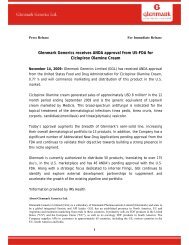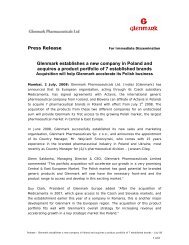Glenmark
Glenmark
Glenmark
You also want an ePaper? Increase the reach of your titles
YUMPU automatically turns print PDFs into web optimized ePapers that Google loves.
In relation to our generic pharmaceutical business, at times, companies in this business may seek approvals<br />
to market generic products before the expiration of applicable patents, based upon the belief that such<br />
patents are invalid, unenforceable, or would not be infringed by such company's products. As a result, such<br />
a company may face the risk of significant patent litigation. Depending upon a complex analysis of a<br />
variety of legal and commercial factors, if such company wins a lower court decision in such patent<br />
litigation, it may, in certain circumstances, elect to market a generic product even though an appeal of the<br />
lower court decision is pending. While it is not our current policy to launch a generic product on such “at<br />
risk” basis, should we or our marketing partner elect to proceed in this manner in the future based on<br />
scientific analysis or business judgment, we could face the risk of incurring substantial patent liability<br />
damages in the future.<br />
Our management team and other key personnel are critical to our operations. If we are unable to<br />
continue to attract and retain such personnel, our operations could be negatively affected.<br />
We are dependent on members of our senior management team as well as members of our scientific,<br />
technical and business staff and our employees for the smooth operation of our business. These personnel<br />
possess technical and business capabilities that are difficult to replace. The loss of any of these principal<br />
members of our scientific or management staff, or failure to attract or retain other key scientific, technical<br />
and business employees, could prevent us from pursuing our business objectives or developing and<br />
commercialising our products. Recruiting and retaining qualified scientific personnel to perform research<br />
and development work are critical to our success. Qualified personnel are difficult to attract and retain. We<br />
may not be able to continuously attract or retain such personnel, or retain them on acceptable terms, given<br />
the demand for such personnel among pharmaceutical and healthcare companies, universities and nonprofit<br />
research institutions. Although we believe we enjoy good relations with our staff and employees, no<br />
assurance can be given that relations will not be disrupted either as a result of disputes or negative external<br />
factors.<br />
Our operations are subject to environmental, employee, health and safety laws and regulations.<br />
Our operations are subject to various national and state environmental laws and regulations relating to<br />
environmental protection in the various locations in India and internationally where we operate. For<br />
example, the discharge or emission of chemicals, dust or other pollutants into the air, soil or water that<br />
exceed permitted levels and cause damage to others may give rise to liabilities to the government and third<br />
parties, and may result in our incurring costs to remedy any such discharge or emissions. See also “ – The<br />
manufacture and storage of pharmaceutical and chemical products is subject to environmental regulation<br />
and risk”. There can be no assurance that compliance with such environmental laws and regulations will<br />
not result in a curtailment of production or a material increase in the costs of production or otherwise have<br />
a material adverse effect on our financial condition and results of operations. Environmental laws and<br />
regulations in India have become increasingly stringent, and it is possible that they will become<br />
significantly more stringent in the future. If any of our plants or operations are shut down, we may<br />
continue to incur costs in complying with regulations, appealing any decision to close our facilities,<br />
maintaining production at our existing facilities and continuing to pay labour and other costs<br />
notwithstanding the closure of any such plant or operation. Stricter laws and regulations, or stricter<br />
interpretation of the existing laws and regulations may impose new liabilities on us or result in the need for<br />
additional investment in environmental protection equipment, either of which could affect our business,<br />
financial condition or prospects.<br />
We are also subject to laws and regulations of the countries in which we operate that govern relationships<br />
with employees in such areas as minimum wage and maximum working hours, overtime, working<br />
conditions, hiring and terminating of employees, contract labour and work permits. Furthermore, the<br />
success of our business is contingent upon, among other things, receipt of all required licenses, permits and<br />
authorizations, including local land use permits, manufacturing permits, building and zoning permits and<br />
environmental, health and safety permits. Changes or concessions required by regulatory authorities could<br />
also involve significant costs and delay or prevent completion of the construction or opening of a plant or<br />
could result in the loss of an existing license. Inability to renew expired licenses and approvals, failure to<br />
comply with applicable regulatory requirements and/or failure to comply with the conditions of our licenses<br />
13



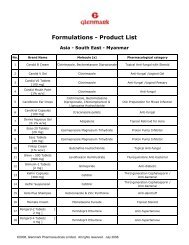
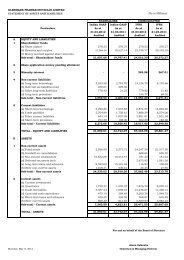
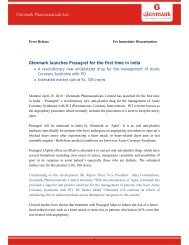
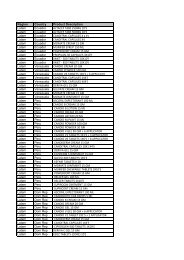
![Formulations [India] â Product List - Glenmark](https://img.yumpu.com/46601329/1/190x245/formulations-india-a-product-list-glenmark.jpg?quality=85)
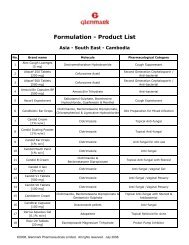
![Formulation [India] â Product List - Glenmark](https://img.yumpu.com/44013338/1/190x245/formulation-india-a-product-list-glenmark.jpg?quality=85)
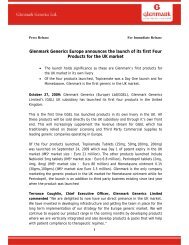

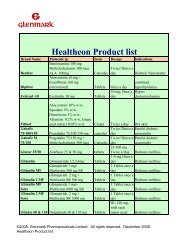
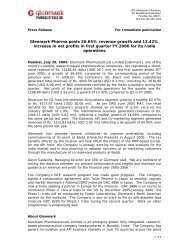
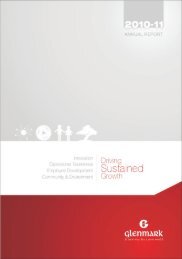
![Formulations [India] â Product List - Glenmark](https://img.yumpu.com/35994839/1/190x245/formulations-india-a-product-list-glenmark.jpg?quality=85)
